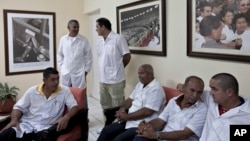Cuba on Tuesday reimposed limits on doctors leaving the country, saying its universal and free health care services had been "seriously affected" by the flight of vital medical specialists.
In a rare backtrack by Cuba on modernizing reforms of recent years, the communist government said it would reapply restrictions that had been lifted in 2013.
The move was Havana's response to a U.S. program that it sees as an attempt to drain Cuba of doctors, nurses and other specialists working in third countries.
The Cuban Medical Professional Parole Program, begun in 2006, allows Cuban medical personnel conscripted to study or work in a third country under the direction of the Cuban government to enter the United States. It remains in effect, even though President Barack Obama restored diplomatic relations with Cuba this year.
Medical professionals now need special permission to leave the Caribbean island for personal travel, marking the second restriction imposed on Cuban emigration in a week amid a crisis in Central America, where thousands of Cubans trying to reach the United States have been stuck at border crossings.
Ecuador on Thursday began requiring visas for Cubans traveling to that South American country, cutting off one route Cubans had preferred to reach the United States.
From Ecuador, where until Monday Cubans could fly without a visa, they start a 7,000-kilometer (4,400-mile) overland journey involving eight illegal border crossings to reach the U.S. border. Once there, Cubans receive preferential treatment to enter and obtain permanent residence with relative ease.
A sudden spike in November led Nicaragua to seal its southern border with Costa Rica, where some 4,000 Cubans are stuck in harsh conditions. Another 850 are backed up in Panama, unable to cross into Costa Rica.
While attributing the exodus to "fundamentally economic motivations," Cuba also blamed U.S. policies that welcome Cubans while immigrants from neighboring countries face deportation. In bilateral migration talks in Washington on Monday, Cuba said it "once again demanded the elimination" of those provisions.
Cuba generates major export earnings by sending more than 50,000 health workers to more than 60 countries, funding health care at home but also aggravating the doctor shortage. Cuba also sends many doctors abroad on missions of mercy.
Restrictions long imposed by Cuba on doctors were lifted by a general immigration law in 2013 that gave Cubans wider freedom to leave. For decades, it had been very difficult for any Cuban to travel abroad and even more so for medical personnel.





